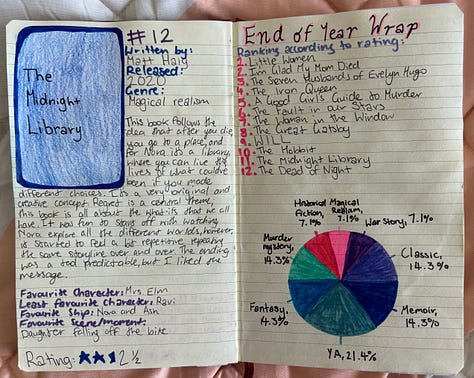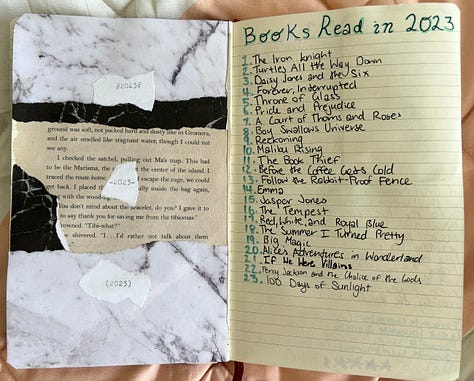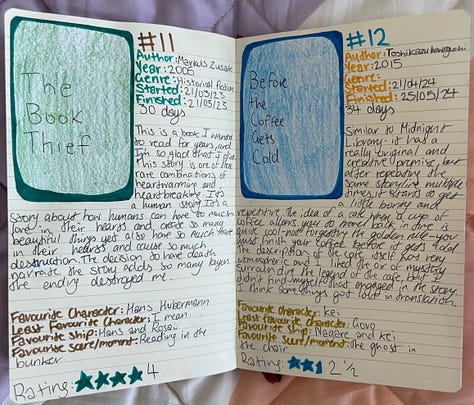A Few Things I've Learned About Writing Over the Years
Yes, another Substack post about writing.

I’ve loved writing my entire life, but 2020 was the year I fully immersed myself in world of writing and would’ve actually considered myself to be ~ a writer ~, whatever that means. In the years since, I’ve spent countless hours writing, have taken a number of writing classes, and I just finished my first year of university where I’m majoring in English and Writing. So it’s safe to say writing is something I think about a lot. Right off the bat: I’m by no means a professional or advanced writer or some master of the craft; I’m far from it. I just felt compelled to write a post about some of the things I’ve learned about writing over the years, and who knows, someone might even find this helpful. If someone who was a complete beginner to writing asked for advice, this is what I’d say.
1. Experiment with your writing.
In the years since I started really getting into writing, I’ve written short fiction stories, I’ve written long fiction stories, I’ve written poems, songs, formal essays, informal essays, screenplays, reviews, you name it. No, most of them weren’t very good. And no, most of them will never see the light of day (but that’s okay, because you should write for yourself first and foremost before you write for anybody else).
You cannot get better at anything without a bit of trial and error. You have to be experimental; you have to take risks; you have to figure out what works for you and what doesn’t work for you. Experimenting with your writing is a great way to figure out where your strengths and weaknesses lie as a writer. You cannot write something good without first writing a lot of things that are bad. Give yourself permission to suck at the start.
When I was younger and was in the school band (yes, I was a band kid and a theatre kid, my high school experience truly was tragic), my band teacher would constantly drill home the importance of practice. Every single lesson, she would emphasise that we would never get better at our chosen instrument if we didn’t practise. But not just practise, consistent practise. She would always encourage us to pick up our instrument at least once a day, even if it was only to play for five minutes, because five minutes is still better than nothing. Looking back, I’m really glad I had that message drilled into me young, because I’ve applied it to so many other areas of my life.
It’s the same for writing. You cannot get better at writing without consistent practice. Writing one story or poem and expecting it to be great on the first try is like going to the gym once and expecting to see a difference in the mirror when you come home. It takes time; it takes effort; it takes consistency. I’ve written pretty much every day for the last five or so years. When I look back on the things I wrote when I was first starting out and compare it to the things I’m writing now, there is a significant and noticeable difference. Don’t get me wrong, my writing is still far from perfect, but it’s definitely better than it was. A large part of that is due to consistent practice. Even just five minutes of writing every day can make a difference. If you keep writing consistently, eventually you will see improvement.
So write a lot, write consistently, and take risks. Taking risks when writing can be scary, but some of my favourite pieces of art are ones that were born from the creator taking a creative risk in the process of making it.
2. Experiment with your reading.
I’m a firm believer that you cannot be a writer without first and foremost being a reader. A writer who doesn’t like to read is like a musician who doesn’t like to listen to music… it just doesn’t make sense. I think it’s important for writers to have a wide reading palette. In the same way you should be experimental with your writing, you should be experimental with your reading. If you only ever read romance novels, try reading a murder mystery. If you only ever read fantasy novels, try reading a nonfiction book.
In the last 3 or so years, I’ve made a conscious effort to be more experimental in the genres I read. I’ve read a lot of great books I really enjoyed through doing this, but I’ve also read a lot of books I didn’t enjoy through doing this. Reading more widely in this way has had a positive impact on my writing. I also think it’s important to be analytical about the books we read. If I like a book, I try to pinpoint exactly what it was about the book that made me like it. On the flip side, if I don’t enjoy a book, I try to consider what components made me dislike it and what could’ve been done to improve my reading experience. Keeping a reading journal is a great way to keep track of the books you read and your thoughts on them.



After a while, you’ll start to find patterns of things you do and don’t like in books, which can help you figure out what things you want to include or avoid in your own writing.
3. Learn about the craft.
It’s almost something of a debate in the writing world whether or not it’s necessary to learn about “the craft.” While you don’t technically have to learn about the more technical sides of writing in order to be a good writer, I think it’s something that can be of huge benefit. Over the years, I’ve taken classes on the craft of writing, I’ve read books on the craft of writing, I’ve spent hours watching videos or listening to podcasts on the craft of writing. As soon as I started learning about the tricks of the trade and the technicalities of the craft, my writing improved so much.
One great aspect of things like writing workshops and courses is the feedback. Feedback from not only your teachers, but your peers as well. Having a pair of eyes other than your own look over your work is so valuable, because they can often pick up on things you might’ve missed. If there’s no writing workshops in your area, there’s still dozens of writing workshops available online. And if paying for a writing course is something that’s not really in your budget, then there’s still so many free online resources.
Abbie Emmons is a self-published author and a YouTuber who makes videos on the craft of writing, and I’ve learned so much from watching her videos over the years. ShaelinWrites is another great YouTuber who makes videos about writing tips and tricks. Ana Neu is an Australian writer who does writing vlogs and makes a lot of videos on how to stay motivated and inspired. Jed Herne is a fantasy author who makes videos specifically on the craft of writing fantasy books. There’s a podcast I love by an author named James Thayer called, “The Essential Guide to Writing a Novel.” In each episode, he breaks down a different aspect of writing a novel. He has a book by the same title which I’m currently reading. These are just some of the creators I’ve found over the years that have helped me.
So while writing classes absolutely can be beneficial, they’re by no means the only way to learn about the craft. If you can teach yourself how to play a musical instrument or speak another language through the magic of the internet, then you can definitely teach yourself how to be a better writing through the internet. I’m telling you: put in the time to learn about the craft, your future self will thank you for it.
Again, I want to preface that I’m no expert, rather I’m just someone who’s very passionate about writing and thought it’d be fun to share some of the lessons I’ve learned along the way. If you’re also passionate about writing, then I hope this was in some way useful to you.
See you next time,
- Lilly :)




yes!! feedback and reading have made me a better writer, this is such good advice!!